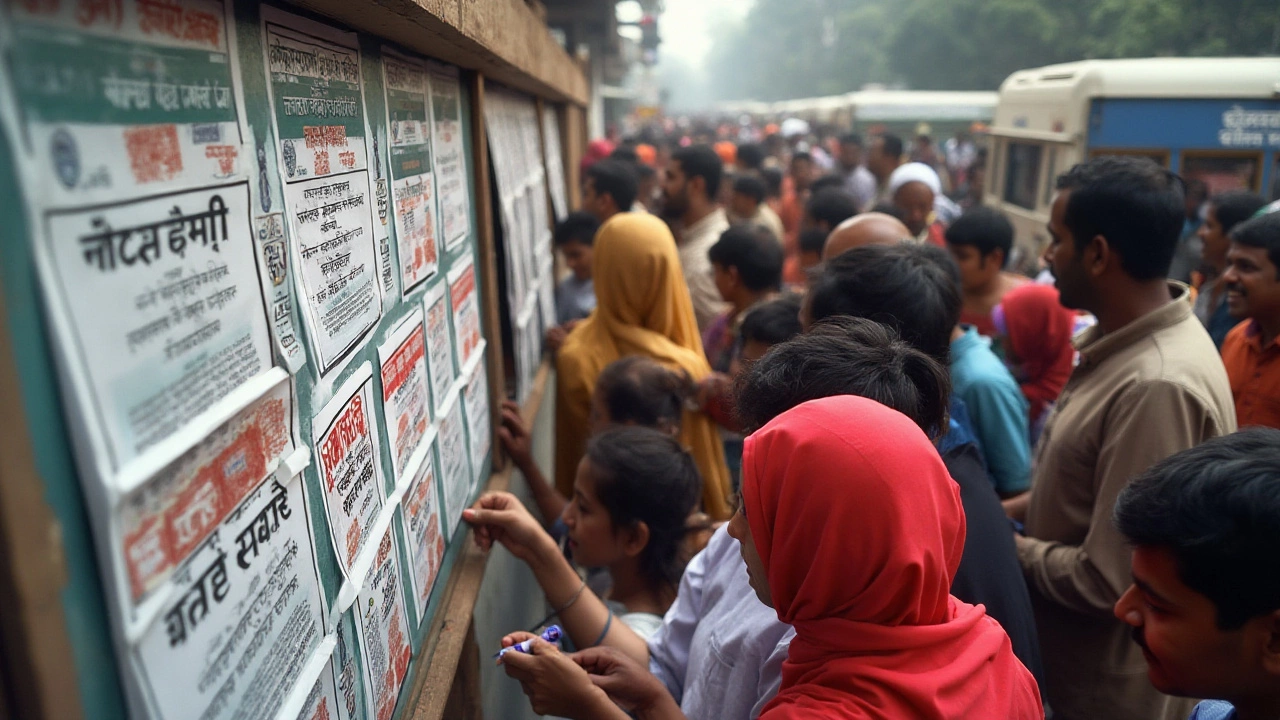Navigating the Path to Securing a Government Job
 Dec, 31 2024
Dec, 31 2024
Dreaming of a stable career within the governmental sector? You're not alone. Many seek government jobs for the sense of security and benefits they offer. Despite the allure, getting in can be a complex journey that demands more than mere interest. It requires a clear understanding of the process, meticulous preparation, and an ability to stand out as a formidable candidate.
Embarking on this path calls for knowing the intricacies of civil service exams, which are often the gatekeepers to entry. The preparation for these exams can be daunting, but with the right strategy, it becomes manageable. Crafting a competitive application is equally essential—after all, the paperwork is often where first impressions are made.
Once your application is noticed, mastering interview strategies becomes the next hurdle. Not only must you be prepared to showcase your experience and knowledge, but you also need the charisma to prove you're the perfect fit for the role. Lastly, it’s crucial to debunk common myths about government jobs that could mislead potential candidates.
Join us as we unravel the path to securing a government job, shedding light on what it truly takes beyond the formal exams and interviews.
- Understanding the Government Hiring Process
- Preparation for Civil Service Exams
- Crafting a Competitive Application
- Interview Strategies for Success
- Common Myths and Misconceptions
Understanding the Government Hiring Process
The road to a cherished position in government often meanders through a labyrinth of procedures and checks designed to select the most suitable candidates. The government hiring process is famously rigorous, meant to ensure only the best fit individuals make it through. One must be prepared for an accessible but competitive recruitment journey that differs largely from the private sector. Government jobs require meticulous attention to the detailed and often deliberate application steps that reflect the increased scrutiny of public service roles. This process is usually multi-layered, including initial application reviews, aptitude tests, screening exams, and various interviews, all designed to measure a candidate's suitability to perform a role within a public framework.
The starting line in this marathon is usually the submission of an online application via a specific portal or government website, which is crucially important given its role in creating that all-important first impression. Aspirants should review job announcements diligently. These descriptions detail the essential skills and experiences needed, often hinting at the kind of candidate sought. A well-crafted application not only meets these criteria but highlights them explicitly. Among the most daunting stages is the civil service examination phase, notorious for its breadth and intensity, typically structured to gauge the overall aptitude across various skills.
For those lucky enough to progress past preliminary assessments, the interview process is the next milestone. Here, candidates are often grilled on policy understanding and management skills. It's a space to shine by demonstrating both mental agility and a deep, abiding interest in public service ideals. The government seeks individuals who are not only skilled but also dedicated to serving societal needs. Interviews can be a blend of panel discussions, one-on-one conversations, and task-based scenarios, each scrutinizing the candidate's ability to fit seamlessly into bureaucratic fabric.
"The best way to predict the future is to create it," a famous quote that holds particular poignancy in public service, guiding candidates to prioritize creativity and initiative during interviews.
Frequently, candidates find reassurance in knowing that the government hiring process, though exhaustive, is also laden with transparency. Most agencies provide clarity on results timelines and feedback mechanisms. This creates a foundation of trust between applicants and the institution. Maintaining open lines of communication and arming oneself with patience is a vital part of successfully navigating this demanding yet rewarding ordeal. Those who survive the entire process are rewarded with the stability and unique opportunity that only government jobs can offer—a chance to contribute positively to societal progress.
Preparation for Civil Service Exams
Stepping into the world of government jobs starts with a critical hurdle: the civil service exams. Known for their rigor and competitiveness, these exams are often the gatekeepers to a rewarding career in the public sector. It isn't just about being well-read; it involves strategic preparation that can make or break your attempt to secure a position. Understanding the format and structure of the exam is crucial. Many prospective government employees tend to underestimate the importance of this phase, which requires more than just memorization of facts. Applicants need a comprehensive approach that combines time management, study schedules, and understanding the core subjects crucial for the exams.
The first step in preparing for these exams is to gather detailed information about the specific tests relevant to your desired government role. Different positions call for varied types of exams, each with its own unique set of challenges and subjects. This could include analytical reasoning, quantitative aptitude, or general knowledge. Identifying key areas where you need improvement can help you streamline your study efforts effectively. A thoughtful and methodical approach towards preparation is indispensable here. Engaging with preparatory courses or self-study guides often proves beneficial. It helps dive deeper into each subject, offering further insights into what the civil service exams demand from their candidates.
Utilizing Resources and Study Materials
Another aspect worth considering is the use of diverse study materials. Books, online courses, and practice tests are great resources that provide substantial guidance. For example, practice tests give you a simulated exam environment, helping assess your time management skills and pinpoint areas needing refinement. Additionally, engaging with community study groups can be a noteworthy strategy. This brings an opportunity for discussion and exchanging ideas, which helps solidify your understanding. It's essential to keep in mind that being consistent with your preparation is just as vital as the methods you choose. Regular revisions and sticking to a study timetable often lead to the desired success.
Some fascinating data suggests that applicants who spend three to six months in dedicated preparation note higher success rates. Candidates should focus on setting realistic daily goals, ensuring that each study session is productive and aligned with the overall study plan. Avoiding last-minute cramming and instead opting for continuous learning helps in internalizing information. Incorporating short breaks during study hours also maximizes retention.
"Success is where preparation and opportunity meet." – Bobby Unser. This quote aptly captures the essence of what it means to prepare for the civil service exams. It's about being ready, so when the opportunity knocks, you are there to seize it.
In the light of this, remember that preparation is not a one-size-fits-all scenario. Your study plan should be as unique as your application. While some may thrive with nocturnal study sessions, others might find early morning hours more productive. Fine-tuning your schedule to best align with your personal study preferences can enhance your preparation efficiency. Finally, take heed of previous years' exam patterns and cutoffs; they provide valuable insights into the nature of the exam and the level of competition, allowing you to set achievable targets. Thus, dedication and strategy, when combined, pave the path for success in securing coveted government jobs.

Crafting a Competitive Application
Creating a strong application for government jobs is like sculpting a piece of art; it requires precision, diligence, and a bit of flair. In the arena of government employment, your application is often your first handshake with a potential employer, an initial impression that can set the tone for all further interactions. The goal is to stand out amidst a sea of applicants, many of whom bring stellar qualifications and deep experiences to the table.
Start with your resume, which should serve as a concise yet comprehensive reflection of your professional journey. Tailor it to each specific position, ensuring that the skills and achievements highlighted align well with the job description. This may seem like basic advice, but it is crucial. Delve deeply into the critical attributes sought after in the posting, and weave them seamlessly into your narrative. Use quantifiable achievements to demonstrate your effectiveness, like "improved process efficiency by 30%" or "led a team of 15 to deliver a $2 million project ahead of schedule." These specifics can give your application the edge it needs.
Behind a successful application lies exhaustive research. Understand the agency's mission and core values; an alignment of your personal and professional ethos with that of the organization can significantly enhance your appeal. Scour the official websites, read reports, and keep abreast of the latest news about the sector. Every piece of insight gleaned can be an arrow in your quiver. As stated by a seasoned recruiter from the civil sector,
"An applicant who knows the ins and outs of the department and can align their skills to our goals stands out as not just a candidate but a potential team member."
Your cover letter is your narrative canvas—use it to tell your story in a compelling way, illustrating why you are the right fit for the position. Go beyond restating your resume; instead, delve into the motivations driving your application, the values that align you with the agency, and the unique perspectives you bring. Each paragraph should unfold logically, leading your reader through a well-crafted argument for your candidacy.
Don’t underestimate the power of formatting. A clean, modern layout speaks to your attention to detail and professionalism. Use consistent fonts and clearly defined headings to guide the eye naturally through your document. Ensure all information is accurate, from contact details to employment dates; discrepancies can create skepticism and harm your credibility. Attention to these seemingly minute details reflects your seriousness about the job application.
Setting yourself apart sometimes also involves additional documents that showcase your skills and competencies, such as writing samples or portfolios of work. If relevant, include these in your application package with a clear indication of their purpose and relevance. With many agencies utilizing automated systems to filter applications, incorporating specific keywords found in the job description can ensure your application gets into human hands.Civil service exams may be part of the application process, but having a tailored, polished submission arguably makes the biggest impact.
Interview Strategies for Success
Walking into an interview for a coveted government job can feel daunting, but with the right preparation, you can transform nerves into confidence. The key lies in understanding what the panel is looking for in a candidate. Government roles often demand a keen understanding of public service values, analytical skills, and the ability to navigate bureaucracy efficiently. It's vital to demonstrate not just your qualifications, but your commitment to these core principles. Begin by researching the agency's mission and recent projects; showing up with background knowledge sets you apart and illustrates genuine interest.
One effective strategy for government interview success is mastering the STAR method: Situation, Task, Action, and Result. This technique aids in structuring responses to behavioral interview questions, a common staple in the government hiring process. For instance, when asked to describe a time you navigated a challenging situation, start by setting the scene (Situation), explain your specific role (Task), outline what steps you took (Action), and conclude with the outcomes (Result). This approach not only keeps your answers organized but also makes them impactful.
Interestingly, a study by the National Association of Colleges and Employers found that candidates who illustrate their skills through storytelling consistently perform better in interviews. This aligns with the fact that human brains are wired to remember narratives much more easily than statistics or dry data. Use this to your advantage by weaving your experiences into a compelling narrative that highlights your suitability for the role.
"A well-prepared candidate in a government interview must not just answer questions, but also ask insightful ones,” says John Doe, a seasoned HR professional for a major government agency. “It shows you're engaged and think critically about how you might fit into the agency's goals."Preparing thoughtful questions about the agency's current challenges or upcoming projects can underscore your curiosity and eagerness to contribute beyond the basic requirements.
Mock interviews serve as another pillar of preparation. Rehearse with a friend or mentor who can provide candid feedback on your communication style and body language. Government jobs often involve communicating with the public, colleagues, and stakeholders; therefore, demonstrating clear and effective communication skills is paramount. Pay attention to your tone, clarity, and eye contact, as these non-verbal cues significantly influence the panel's perception.
Technical Competence
In terms of technical competence, familiarize yourself deeply with the specific skills listed in the job description. Whether it's proficiency with certain software or knowledge of specific legislation, demonstrate your competence through examples from your past work. If the role requires regular use of data or specific tools, come prepared to discuss how you've successfully leveraged these in previous roles. A great way to present this is by preparing a small portfolio or presentation highlighting your achievements relevant to the government job you're applying for.
Additionally, many government interviews include hypothetical situational questions designed to assess your problem-solving abilities. For these, practice thinking on your feet. Structure your response around a logical problem-solving framework, ensuring you articulate your thought process clearly. Show how your analytical skills and creativity work together to yield practical solutions in complex scenarios.
This harmony of thoughtful preparation, strategic storytelling, and interpersonal aptitude can substantially increase your chances of securing a role in a competitive government environment. By embodying the values prized by civil service, and demonstrating both a personable and professional demeanor, you position yourself as an ideal candidate for the job.

Common Myths and Misconceptions
Embarking on the journey to secure a government job often brings with it a swarm of misconceptions. Many believe that landing such a position is solely based on 'knowing the right people.' While networking may play a role in any career, government hiring processes are designed to be as impartial as possible, emphasizing merit through stringent selection criteria and civil service exams. Some envisage the work environment as overly bureaucratic and stagnant, however, modern government agencies are dynamic and continuously evolving, offering ample room for creativity and innovation.
Rumor has it that government jobs require flawless academic records, yet this isn't entirely true. While academic achievements are valued, they are only one piece of the puzzle. Real-world experience, soft skills, and specialized knowledge often weigh heavily in selection decisions. People also fear that these jobs do not pay well compared to the corporate sector. Nevertheless, government roles frequently offer competitive salaries with stability and benefits like healthcare, retirement plans, and vacation days that make up for any perceived pay gap.
Another common myth is that the hiring process is obscure and unfathomable, yet transparency is a cornerstone of civil service. Publicly available resources and clear guidelines map out the steps involved in applying and qualifying for positions. As Frank Benest, former City Manager of Palo Alto, expresses,
"Effective public sector careers require understanding both the explicit procedures and the implicit opportunities for contribution."
Lastly, some people wrongly assume that government jobs lock you into one role for life. On the contrary, government jobs often provide opportunities for growth, mentorship, and lateral moves within the system. Entry-level jobs can open doors to rewarding long-term careers, where dedication and performance lead to advancement. By dispelling these myths and digging deeper into the realities of working in public service, aspiring candidates can better navigate the path to a rewarding government career.